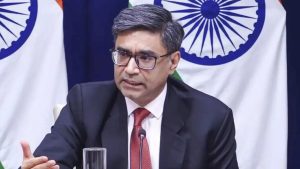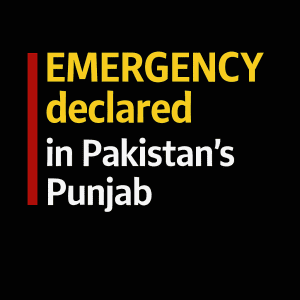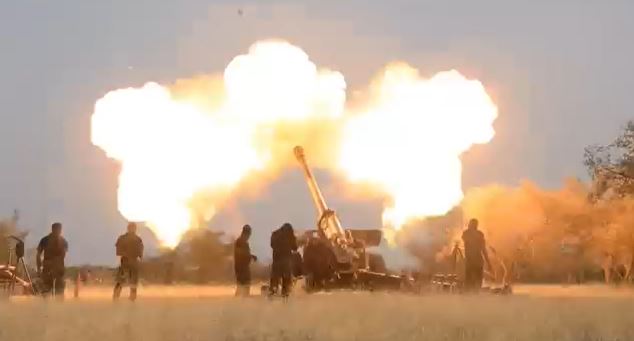India on Wednesday announced it had launched missile strikes on nine targets inside Pakistan and Pakistan-administered Kashmir, in what it described as a retaliatory operation following last month’s deadly attack on Indian tourists in Pahalgam. Residents in the targeted areas reported being jolted awake by loud explosions as missiles struck shortly after dawn.
Pakistan, however, reported six sites were attacked and claimed to have shot down five Indian fighter jets during the confrontation — an assertion not yet confirmed by Indian authorities. Islamabad said at least 26 civilians were killed and 46 injured in the Indian airstrikes and artillery fire along the Line of Control (LoC). In response, India’s army reported that seven civilians died due to Pakistani shelling on its side of the border.
Pakistani celebrities with Bollywood ties condemn Indian airstrikes
Pakistani celebrities, many of whom have worked in Bollywood, in social media posts have strongly condemned India’s late-night airstrikes on Pakistani territory, calling the attacks “cowardly,” “inhumane,” and “politically motivated.”

Mahira Khan, one of Pakistan’s biggest stars who rose to international fame after starring in Bollywood’s Raees opposite Shah Rukh Khan, called the attack “seriously cowardly” and shared a post by Fatima Bhutto describing India as a “rogue actor,” according to a report of leading Pakistani daily, the Dawn.
Mahira said: I have a voice and I CAN use it. India, your war and hate rhetoric has continued for many years. This is not strength. This is shameful. May peace prevail.”
Fawad Khan, another actor who gained massive popularity in India with films like Kapoor & Sons and Khoobsurat, expressed condolences to the families of the deceased.
Tarique Rahman condemns military attacks
BNP Acting Chairman Tarique Rahman condemned military attacks and extended condolences to victim’s families as tensions between India and Pakistan continue to rise.

In a post made on his verified Facebook account on Wednesday, he urged both countries to show restraint and seek a peaceful solution to the conflict.
“A stable and peaceful region, built upon shared interests and aspirations, serves the best interests of all,” he said.
India releases videos of 25-minute strikes
India has released aerial footage of what it described as 25-minute precision strikes targeting nine alleged terror camps in Pakistan and Pakistan-administered Kashmir early Wednesday.
Indian NDTV quoted Indian officials as saying that the strikes killed around 70 militants affiliated with groups such as Jaish-e-Mohammad (JeM), Lashkar-e-Taiba (LeT), and Hizbul Mujahideen.

The Indian Army said the operation began at 1:04 am and concluded by 1:30 am, targeting sites in Kotli, Sialkot, Muzaffarabad, Bahawalpur, and Muridke.
Among the reported targets, the Markaz Abbas camp in Kotli was claimed by the Indian Army as a suicide bomber training hub, while the Gulpur camp linked to the 2023 Poonch attack and the 2024 bus bombing, and the Sarjal camp in Sialkot tied to the killing of four police officers in March.
The Indian Army also claimed that the targeted headquarters of JeM and LeT in Bahawalpur and Muridke were training grounds for figures like Ajmal Kasab and David Headley.
Indian authorities claimed these camps were used to train militants in explosives, infiltration, and jungle warfare techniques. Videos released by the defence establishment show guided munition strikes on multiple compounds.
Concerned Bangladesh calls for diplomatic efforts
Bangladesh on Wednesday expressed deep concern as tensions continue to skyrocket between India and Pakistan and urged both countries to remain calm, show restraint, and refrain from taking any actions that would further exacerbate the already precarious state of affairs.

In a brief press release, the Ministry of Foreign affairs stated that the government “is closely observing the evolving situation in India and Pakistan.”
It said: In the spirit of regional peace, prosperity, and stability, Bangladesh remains optimistic hoping for the conflict to be resolved through diplomatic endeavours.
Commercial flights avoiding airspace in Pakistan, India after airstrike
The military tension between New Delhi and Islamabad following Indian airstrikes on multiple Pakistani locations has prompted several Asian airlines, including of Bangladeshi ones, either to cancel or reroute flights.

Navigational data on Wednesday indicated that airspace over northern India and southern Pakistan had been nearly cleared, according to the FlightRadar24, the website monitoring live flights from across the globe.
Pakistan’s entire airspace was nearly free of civilian aircraft, barring a few flights, according to a report by Al Jazeera network.
The network reported citing a monitoring agency that Indian military aircraft flying over northern India and a Pakistani government aircraft in the south of the country via air navigation tracking sites.
This occurred just hours before the airspace was entirely cleared, coinciding with several flights diverting their routes from Pakistan, reported the network.
FlightRadar24 reported in the morning that 52 flights to and from Pakistan were cancelled as of Wednesday. There were 57 international flights operating in Pakistan’s airspace when India struck, according to a Pakistan army spokesperson.
Indo-Pak escalation drags Bangladesh’s equity index to 5-year low
The equity market in Bangladesh suffered a significant setback on Wednesday, as escalating geopolitical tensions between neighbouring nuclear-armed India and Pakistan rattled investor confidence across South Asia.

The Dhaka Stock Exchange (DSE) saw its benchmark DSEX index plummet by 149 points — the steepest single-day drop since 29 October 2024 — closing at 4,802. This marks the index’s lowest level since 25 August 2020.
Market breadth was deeply negative, reflecting widespread investor anxiety. Out of the total traded issues, only nine advanced, while 385 declined and five remained unchanged.
Market analysts attributed the sharp fall primarily to fears surrounding the India–Pakistan conflict, which has intensified after India launched targeted military strikes against what it called terrorist infrastructure in Pakistan-administered territory.
India holds first nationwide civilian war drills since 1971
In a clear escalation of regional tension, India on Wednesday launched large-scale civilian “mock drills” across several states, simulating wartime conditions amid intensifying conflict with Pakistan.

The campaign, officially described as a preparedness initiative, is being widely promoted by Indian authorities and media.
The drills are designed to train civilians on how to respond in the event of direct military conflict—particularly aerial bombings.
According to the Indian Home Ministry, 244 locations in various states were instructed to prepare for these drills.
Of those, 31 locations were in West Bengal, just across the border from Bangladesh.
As fears of full-scale war between the two nuclear-armed nations intensify, this is the first time since the 1971 Bangladesh Liberation War that India has initiated such widespread civilian war drills. Then, similar exercises were held in West Bengal. Now, 53 years later, the drills return under graver regional circumstances.
Israel backs India’s right to self-defence
A few hours after India launched a precision strike targeting nine establishments in Pakistan and Pakistan-administered Kashmir, Israel has extended its support to New Delhi, defending its right to self-defence.

Ambassador of Israel to India, Reuven Azar took to X and shared that Israel supports India’s right to self-defense.
“Terrorists should know there’s no place to hide from their heinous crimes against the innocent,” he added.
Indian airstrike killed 10 family members: Masood Azhar
Maulana Masood Azhar, top leader of Jaish-e-Mohammad(JeM), claimed 10 members of his family and four close associates have been killed in Indian missile attack on the Subhan Allah Mosque in Bahawalpur, Pakistan.

A statement issued by JeM on Wednesday claimed that the deceased included Maulana Masood Azhar’s elder sister and her husband, Masood Azhar’s nephew and his wife, another niece, and five children from his family, report agencies.
Indian Ministry of Home Affairs branded Maulana Mohammad Masood Azhar as number one “terrorist”.
The JEM statement also said that a close aide of Masood Azhar and his mother, along with two other close associates, were also killed in the attack on Tuesday night.
JeM criticised Indian Prime Minister Narendra Modi, saying, “This atrocity broke all the rules, no one should hope for mercy now”.
A history of wars rooted in Kashmir
To understand the current flare-up, analysts point back to the region’s complex post-colonial legacy. India and Pakistan have fought several wars—directly or indirectly linked to the contested territory of Kashmir.

1947–1948: The first Kashmir war: Soon after the British left the subcontinent, the princely state of Jammu and Kashmir—then ruled by a Hindu monarch despite its Muslim-majority population—became the flashpoint of the first India-Pakistan war. Thousands died before a UN-brokered ceasefire left the region divided.
1949: Promise of a plebiscite: The ceasefire agreement included a provision for a UN-supervised plebiscite to let the people of Kashmir decide whether to join India or Pakistan. That referendum has yet to take place, fueling decades of discontent.
1965: The second Kashmir war: Pakistan attempted to infiltrate Indian-administered Kashmir, sparking a second war. It ended after international mediation, particularly by the Soviet Union and the United States, and resulted in the Tashkent Agreement, with both sides withdrawing to pre-war positions.
1972: Line of Control established: Following the 1971 war, the Simla Agreement formalized the ceasefire line in Kashmir as the “Line of Control” (LoC). Since then, this heavily militarized border has remained one of the world’s most dangerous flashpoints.
Pakistan further downgrades ties with India
Pakistan’s national security committee (NSC) decided to suspend trade ties with India, closure of Wagah border crossing, downgrading of diplomatic ties and expressed caution that any attempts to usurp its water rights will be considered as an “act of war.”

The decision was taken at a meeting of the National Security Committee headed by Prime Minister Shehbaz Sharif. Top civil and military leadership joined the meet in Islamabad that reviewed the latest situation in the aftermath of an airstrike carried out by Indian forces, according to a report by Pakistan’s state-run APP news agency .
Following the strikes in Pakistan, Prime Minister Shehbaz said late Tuesday that Pakistan had every right to give a “fitting response” to India after it conducted missile strikes against Pakistan.
“The enemy has carried out cowardly attacks in Pakistan and we are ready to give a befitting response to this act of war imposed on us,” he said in a statement issued by the PM Office.
Russia ‘deeply’ concerned
Russian Foreign Ministry in a statement expressed concern over the rising military tension between New Delhi and Islamabad following the Indian attack on Pakistani territory in the aftermath of last month’s terror attack in Pahalgam.

“We are deeply concerned by the heightened military tensions between India and Pakistan in the wake of a terror attack near the town of Pahalgam,” Foreign Ministry Spokeswoman Maria Zakharova said on Wednesday.
According to Zakharova, “Russia resolutely condemns acts of terrorism as it opposes any manifestations of it and accentuates the need to join forces globally for an effective fight against this evil.”
“We call on the parties concerned to exercise restraint in order to prevent the situation in the region from escalating,” the diplomat continued.
Russia hopes the latest dispute between New Delhi and Islamabad would be resolved through peaceful political and diplomatic means on a bilateral basis in accordance with the provisions of the 1972 Simla Agreement and the 1999 Lahore Declaration, she said.
China calls for restraint
China expressed concern over escalating hostilities between India and Pakistan, urging both nuclear-armed neighbours to exercise restraint.
Beijing stated it regretted India’s military action, calling the situation “a matter of concern.”

“India and Pakistan are neighbours that cannot be moved apart—and they are also China’s neighbours,” said a spokesperson for China’s Foreign Ministry in an official statement.
China, which shares land borders with both nations, is a longstanding ally of Pakistan and a principal backer of its Belt and Road Initiative. At the same time, Beijing maintains a complicated and often tense relationship with India, marked by a protracted border dispute.
“China opposes all forms of terrorism,” the statement added, while calling on both countries to prioritise peace and regional stability. “We urge both India and Pakistan to remain calm and restrained, and to avoid actions that could further escalate the situation.”
Airlines avoiding Pakistan airspace
Leading international airlines and some regional airlines operating in South Asia are avoiding flying over Pakistan.

Pakistan’s flag carrier ,PIA, on Wednesday cancelled all flights to and from Gilgit, Skardu and other northern areas in Pakistan-administered Kashmir due to security reasons amid rising tensions with India following the Pahalgam terror attack.
Citing the flight schedule, Urdu daily Jang the news agency reported that the Pakistan International Airlines (PIA) cancelled two flights each from Karachi and Lahore to Skardu.
Air France and Germany’s Lufthansa were among global carriers avoiding Pakistani airspace, airlines and flight trackers showed, as tensions between India and Pakistan remained high.
Pakistan summons Indian chargé d’affaires
Pakistan summoned the Indian Chargé d’ Affaires to the Ministry of Foreign Affairs to receive Pakistan’s protest over the Indian strikes at multiple locations across Pakistan and Pakistan-administered Jammu and Kashmir.

“The Indian Chargé d’Affaires was summoned to the Ministry of Foreign Affairs today to receive Pakistan’s strong protest over the unprovoked Indian strikes at multiple locations across Pakistan and Azad Jammu and Kashmir. These strikes resulted in the deaths and injuries of several civilians, including women and children,” an official release of Pakistan’s Foreign Ministry said.
The foreign ministry statement added: “It was conveyed that India’s blatant act of aggression constitutes a clear violation of Pakistan’s sovereignty. Such actions are in contravention of the UN Charter, international law, and established norms governing inter-state relations. Pakistan firmly rejected India’s baseless justifications for its hostile conduct.”
US security alert
US diplomatic mission in Pakistan issued a security alert advising American citizens to leave areas of active conflict, saying it is “closely monitoring developments” following Indian airstrikes on Pakistan and Pakistan-administered Kashmir.

The US mission under title of ‘Military Activity and Closed Airspace’, said “We are aware of reports of military strikes by India into Pakistan. This remains an evolving situation, and we are closely monitoring developments.”
U.S. citizens are reminded of the “Do Not Travel” advisory for areas in the vicinity of the India-Pakistan border and the Line of Control (LOC) due to terrorism and the potential for armed conflict, and the U.S. Department of State’s “Reconsider Travel” advisory for Pakistan generally.
India says ‘Operation Sindoor’ aimed only at terror bases, not civilians
India defended its airstrikes on terrorist camps in Pakistan and Pakistan-administered Kashmir, describing the operation—codenamed Operation Sindoor—as a necessary and targeted response to the terrorist attacks carried out more than two weeks ago in Pahalgam.

Foreign Secretary Vikram Misri, while addressing a news conference in New Delhi, said the attacks were aimed at dismantling infrastructure linked to the Resistance Front, a group affiliated with Lashkar-e-Taiba, which had claimed responsibility for the Pahalgam massacre, according to a report by Hindustan Times.
He added, Pakistan has failed to act against these terrorist networks despite credible intelligence and repeated international concerns. “Pakistan has made an identity in the world as a safe haven for terrorists,” he said.
It’s a shame: Trump
“It’s a shame, we just heard about it,” US president Donald Trump said at the White House following India’s missile attack on Pakistan-administered Kashmir and also in mainland Pakistan early Wednesday.

“I guess people knew something was going to happen based on the past. They’ve been fighting for many, many decades and centuries, actually, if you really think about it,” the US President said.
“I just hope it ends very quickly,” said Trump.
The Indian strikes came just hours after the US State Department issued a fresh call for calm.
“We continue to urge Pakistan and India to work towards a responsible resolution that maintains long-term peace and regional stability in South Asia,” State Department spokeswoman Tammy Bruce told reporters.
Pakistan condemns Indian strikes as “Blatant act of war”
Pakistan’s Foreign Ministry strongly condemned India’s missile strikes across the Line of Control, calling the attack “an unprovoked and blatant act of war” that has escalated tensions between the two nuclear-armed neighbours.

In a statement posted on the ministry’s website, Islamabad accused the Indian Air Force of targeting civilian areas in both Pakistan-administered Kashmir and multiple districts near the international border—specifically Muridke, Sialkot, and Bahawalpur.
The statement claims the strikes resulted in the deaths of civilians, including women and children.
“India’s reckless action has brought the two nuclear-armed states closer to a major conflict,” the ministry said, warning that the assault also endangered commercial air traffic in the region.
The statement further condemned the strikes as a “cowardly” violation of Pakistan’s sovereignty and a breach of the UN Charter and international law.
Indian stocks markets wobble
Indian share markets were lower on Wednesday morning but recovered some early losses following India’s strikes on Pakistan and Pakistan-administered Kashmir.

These military actions were in retaliation for last month’s deadly Kashmir attack that killed 26 tourists. The benchmark Nifty 50 initially opened 0.6% lower but had trimmed losses to 0.2% by 10:30am.
Similarly, the Sensex was down 0.2%. Out of 13 sectors, nine traded lower. However, the mid-cap index gained 0.3%, while small-caps dipped 0.1%.
Amid the geopolitical tensions, Dharmesh Kant, head of equity research at Cholamandalam Securities, advised caution, stating, “The market move may not settle so soon.”
Pakistan’s Punjab province declares emergency
A state of emergency has been declared in Pakistan’s Punjab province, according to the region’s government head Bhagwant Mann.

According to him, Punjab’s security forces and medical services have been placed on high alert, reports TASS news agency from Islamabad.
Earlier, the Indian government announced it had struck nine targets in the Pakistan-administered part of the union territory of Jammu and Kashmir.
According to sources cited by Samaa TV, the Pakistani armed forces launched retaliatory strikes on Indian targets.
India launches missile strikes; Pakistan claims shooting down of five Indian jets
India fired missiles across the border into Pakistan-administered Kashmir early Wednesday, killing at least 8 people, Pakistani security officials said. India said it was striking infrastructure used by militants.
At least three civilians were also killed in shelling by Pakistani troops in Indian-controlled Kashmir, the Indian army said in a statement, reports AP and agencies.

The attacks, labeled Operation Sindoor, targeted nine sites of “terrorist infrastructure” in Pakistan and Pakistan-administered Jammu and Kashmir, according to the Indian Defense Ministry. No Pakistani military facilities were targeted, the Indian Defense Ministry said, calling their actions “focused, measured and non-escalatory.”
India and Pakistan have fought three full-scale wars since gaining independence from the British in 1947. Both claim Kashmir in full but administer separate portions of the disputed region.
The Pakistani army said India struck six locations, including Kotli, Muzaffarabad and Bahawalpur. At least eight people were killed, including a 3-year-old, and another 35 injured, according to the Pakistani army, which claimed civilian buildings were targeted.
The Pakistan Air Force (PAF) has shot down five Indian jets in response to the Indian overnight strikes, said the military sources, adding that four Indian quadcopters were destroyed at two locations in Pakistan for violating the country’s airspace, reports Xinhua from ISLAMABAD.
Pakistan condemned India’s unprovoked and blatant act of war and violation of Pakistan’s sovereignty.


